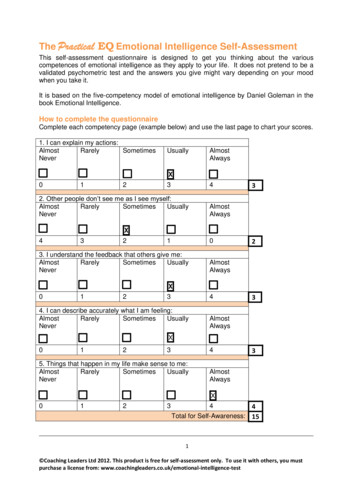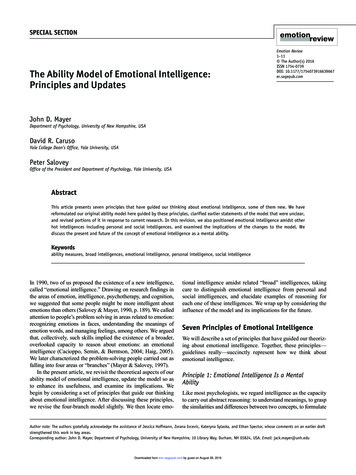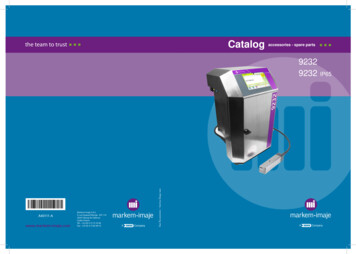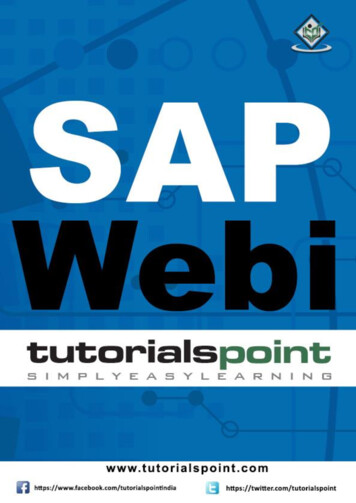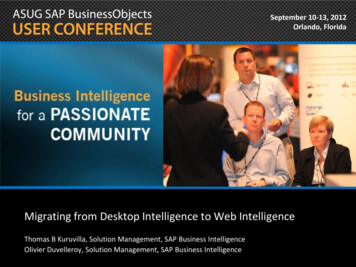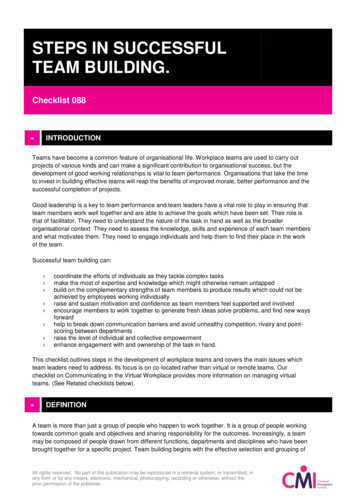
Transcription
"When a team outgrows individual performance and learns teamconfidence, excellence becomes a reality."Team BuildingCoursesProfessional Development Training has a specialised division of Team Buildingexperts that will tailor the delivery of any of the courses to be specific to yoursituation and learning needs
Team Building CoursesTeam Building TrainingEmotional Intelligence (EQ)Leveraging the Generation GapFISH Team Building for CustomerService TeamsFISH the Organisational CultureTraining CourseFISH for LeadersTeam Communication CourseManaging Virtual Teams CourseBuilding High PerformanceTeams Training
Effective Teams are an Essential Element ofSuccessProfessional Development Training has a specialised division of Team Building experts that willtailor the delivery of any of the courses to be specific to your situation and learning needs.Our extensive curriculum in Team Building, outstanding depth of trainers across the country anddiverse range of industry experience means that pd training is the best choice for Team Buildingcourses.pd training will exceed your expectations and help you achieve the results you are seeking.
The ability to successfully manage a cohesive, happy and high-performing team that consistently meets goals, is in highdemand.This Team Leadership workshop from pdtraining teaches how to develop different strategies for leading diverse teams,gain techniques for ensuring effective and productive team meetings and much more!This dynamic training course is available now throughout Australia including, Brisbane, Sydney, Melbourne, Adelaide,Canberra and Perth.Team Building Training OutlineForeword:An increasing number of organisations are relying on teams – project teams, product development teams, virtual teams,and autonomous working teams to compete in a rapidly changing domestic and global market. The reason for this is theability of teams to perform at high levels and adapt quickly to escalating demands. Hence in today’s professionalenvironment, more than ever, there is great emphasis placed on team leadership skills, team communication skills andteam management styles.Team effectiveness is enhanced by a team’s commitment to reflect and perform on-going evaluation. In addition toevaluating accomplishments in terms of meeting specific goals, for teams to be high-performing it is essential for them tounderstand their development as a team.Hence team members need to constantly sharpen their skills as team initiatives often fail due to improperimplementation, conflict and competition. Team Leadership Skills are essential to maintain development and cohesion inthe group.This Team Leadership Training Program will help arm Team Leaders with the skills to create and maintain successfulteams.Outcomes:Learn to identify the different types of teams & develop different strategies for leading themRecognise the different team development stages and behavioursMaster techniques to manage teams at each stage of development, known as Forming, Storming, Norming,Performing & AdjourningDevelop a range of great team building activitiesGain strategies & techniques to ensure effective & productive team meetingsDevelop great team problem solving & facilitation skillsLearn techniques to foster teamwork & create a supportive team culture
Team Building Training Course - Lesson 1Team Building Training Course - Lesson 2Defining SuccessTypes of TeamsWhat is a team?The traditional teamFactors for successSelf-Direct teamsAn overview of Tuckman and Jensen's Four-Phase ModelE-TeamsTeam Building Training Course - Lesson 3The First Stage of Team Development - FormingThe Hallmarks of this stageWhat to do as a leaderWhat to do as a followerTeam Building Training Course - Lesson 4The Second Stage of Team Development - StormingThe Hallmarks of this stageWhat to do as a leaderWhat to do as a followerTeam Building Training Course - Lesson 5The Third Stage of Team Development - NormingThe hallmarks of this stageWhat to do as a leaderWhat to do as a followerTeam Building Training Course - Lesson 6The Fourth Stage of Team Development - PerformingThe Hallmarks of this stageWhat to do as a leaderWhat to do as a followerTeam Building Training Course - Lesson 7Team Building ActivitiesThe benefits and disadvantagesTeam building activities that won't make people cringeChoosing a location for team buildingTeam Building Training Course - Lesson 8Making the Most of Team MeetingsSetting the time and placeTry the 50-Minute meetingUsing celebrations of all sizesTeam Building Training Course - Lesson 9Solving Problems as a TeamThe Six Thinking HatsEncouraging brainstormingBuilding consensusTeam Building Training Course - Lesson 10Encouraging TeamworkSome things to doSome things to avoidSome things to considerWeb Links:View this course rship-training-coursesIn-house Training Instant raining.com/inhouseex1/quoterequestex1a.aspxPublic Classes - Enrol ining.com/publicclassbooking.aspx?courseid 27
Emotions can influence the way we act and react in the workplace. Emotional Intelligence is the ability to recognise ourbehaviours, moods, and impulses, and manage them in a positive way to communicate effectively, empathise withothers, manage stress, overcome challenging situations and defuse conflict.The pdtraining Emotional Intelligence helps you build stronger relationships,succeed at work, and achieve your career and personal goals.This dynamic training course is available now throughout Australia, including Brisbane, Sydney, Parramatta, Melbourne,Adelaide, Canberra and Perth.Please click on the Public Class tab below to view our Emotional Intelligence course schedule by city or click the InHouse Training tab to receive a free quote for courses delivered at your preferred location.Emotional Intelligence (EQ) OutlineForeword:Healthy emotions Clear thinking Appropriate action High EQEmotional intelligence is a skill. And like any other skill, you can get better at it with training and practice. It allows you toread the style of individuals and adjust your communications accordingly.This one day training course is useful for anyone who leads or works with other people, no matter what size theorganisation. This course will focus on the five core competencies of emotional intelligence: self-management, selfawareness, self-regulation, self-motivation and empathy and also include interpersonal skills.Participants will learn to develop and implement these competencies to enhance their relationships in work and life byincreasing their understanding of social and emotional behaviours, and learning how to adapt and manage theirresponses to particular situations.Outcomes:Define Emotional Intelligence (EQ).Identify the benefits of emotional intelligence.Learn the four core skills required to practice emotional intelligence.Define and practice self-management, self-awareness, self-regulation, self-motivation and empathy.Successfully communicate with others in a non-verbal manner.Verbally communicate with others.Interpret and manage your emotions.Master tools to regulate and gain control of one’s own emotionsArticulate your emotions using the right language.Balance optimism and pessimism.Effectively impact others.Relate emotional intelligence to the workplace.Use the concepts and techniques in the workplace.
Emotional Intelligence (EQ) For Professionals TrainingCourse - Lesson 1Getting StartedHousekeeping ItemsWorkshop ObjectivesThe Parking LotAction PlanEmotional Intelligence (EQ) For Professionals TrainingCourse - Lesson 2What is Emotional Intelligence?Benefits of Emotional IntelligenceSnapshot of Academic Theory of EI & Assessing EQ5 Dimensions of the Trait EI ModelLesson 2 Workbook Activity: EQ Self-AssessmentEmotional Intelligence (EQ) For Professionals TrainingCourse - Lesson 3Self-Awareness (SA)Self-AwarenessSelf-ManagementSeeing the Other SideGiving in Without Giving Up – The Art of CompromiseLife Positions – You and Only You Can Choose YourMindsetLesson 3 Workbook ActivitiesEmotional Intelligence (EQ) For Professionals TrainingCourse - Lesson 4Self-Regulation/Managing Emotions (ME)The ‘EQ brain’ and How it WorksThe Science of EmotionsAmygdala Hijack - What’s Happening Inside Our HeadWhen We Lose ControlUnderstanding EmotionsFind Your Self-Control Take Back Your AmygdalaUsing Coping ThoughtsRelaxation TechniquesLesson 4 Workbook ActivitiesEmotional Intelligence (EQ) For Professionals TrainingCourse - Lesson 5Self-Motivation (M)OptimismPessimismThe Balance between Optimism and PessimismThe Power of Re-Framing: The Balance betweenOptimism and PessimismLesson 5 Workbook ActivityEmotional Intelligence (EQ) For Professionals TrainingCourse - Lesson 6Empathy (E)What are the Barriers to Empathy?Developing Your EmpathyLesson 6 Workbook ActivityEmotional Intelligence (EQ) For Professionals TrainingCourse - Lesson 7Social Skills (SS)Making an ImpactCreating a Powerful First ImpressionAssessing a SituationBeing Zealous without Being OffensiveTraits of a Person with High Social SkillsEmotional Intelligence (EQ) For Professionals TrainingCourse - Lesson 8Skills in Emotional IntelligenceHow to Accurately Perceive EmotionsUse Emotions to Facilitate ThinkingUnderstand Emotional MeaningsManage EmotionsLesson 8 Workbook ActivityEmotional Intelligence (EQ) For Professionals TrainingCourse - Lesson 9Verbal Communication SkillsVerbal Communication – Clear Message, EmotionallyEffectiveFocused ListeningAsking QuestionsCommunicating with Flexibility and AuthenticityEmotional Intelligence (EQ) For Professionals TrainingCourse - Lesson 10Non-Verbal Communication SkillsBody LanguageThe Signals You Send to OthersIt’s Not What You Say, It’s How You Say ItEmotional Intelligence (EQ) For Professionals TrainingCourse - Lesson 11Social Management and ResponsibilityArticulate your Emotions Using LanguageBusiness PracticesUnderstand Emotions and How to Manage Them inthe WorkplaceRole of Emotional Intelligence at WorkDisagreeing ConstructivelyEmotional Intelligence (EQ) For Professionals TrainingCourse - Lesson 12Wrapping UpWords from the WiseReview of Parking LotLessons LearnedCompletion of Action Plans and EvaluationsWeb Links:View this course canberra-adelaide-andperthIn-house Training Instant raining.com/inhouseex1/quoterequestex1a.aspxPublic Classes - Enrol ining.com/publicclassbooking.aspx?courseid 100
As more and more generations remain in the workforce for longer periods of time, it becomes necessary fororganisations to embrace and adapt to generational differences.This Generation Gap course from pdtraining, teaches organisations how to increase harmony, what the differences ingenerations are, how to resolve conflict and much more.This engaging course is available now throughout Australia including, Brisbane, Sydney, Melbourne, Adelaide, Canberraand Perth.Leveraging the Generation Gap OutlineForeword:The workplace can present challenges to management in terms of handling the different generations present. As olderworkers delay retiring and younger workers are entering the workforce, the work environment has become a patchworkof varying perspectives and experiences, all valuable to say the least.While having various cultures in one workplace can present communication problems and conflicts, the benefits of such avariety in the workplace outweigh it. Both the young and older worker have many ideas to offer, which can help theorganization thrive in the marketplace. Learning how to deal with the generation gap at work will help you become abetter manager or co-worker.This 'Generations Gap Training Course' will help you understand the various generations present at work and understandwhat motivates each of them and how to work together.Outcomes:Learn the history behind generation gapsLearn about the different generations (traditionalists, baby boomers, Generation Xers & Generation Yers)Understand the differences between each generationFind common ground among the different generationsMaster conflict management between generationsLeverage the strengths of each generation in the workplace
Leveraging the Generation Gap Training Course - Lesson Leveraging the Generation Gap Training Course - Lesson 21TraditionalistContextTheir BackgroundWhat Generations Exist In The WorkplaceTheir CharactersWhat Defines A GenerationTheir Working StyleWhat This Means In Our WorkplaceLeveraging the Generation Gap Training Course - Lesson Leveraging the Generation Gap Training Course - Lesson 43Generation X'sBaby BoomersTheir BackgroundTheir BackgroundTheir CharactersTheir CharactersTheir Working StyleTheir Working StyleLeveraging the Generation Gap Training Course - Lesson Leveraging the Generation Gap Training Course - Lesson 65BackgroundGeneration Y's (millennial)AttitudeTheir BackgroundWorking StyleTheir CharactersLife ExperienceTheir Working StyleLeveraging the Generation Gap Training Course - Lesson Leveraging the Generation Gap Training Course - Lesson 87Conflict Management (1)Finding Common GroundYounger Bosses Managing Older WorkersAdopting A Communication StyleAvoid Turnovers With A Retention PlanCreating An Affinity GroupBreaking Down The StereotypesSharing KnowledgeLeveraging the Generation Gap Training Course - Lesson Leveraging the Generation Gap Training Course - Lesson910Conflict Management (2)The Power of 4Embrace The Hot ZoneBenefits Of Generation GapsTreat Each Other As A PeerHow To Learn From Each OtherCreate A Succession PlanEmbracing The UnfamiliarWeb Links:View this course -generation-gaps-training-courseIn-house Training Instant ra
Team building activities that won't make people cringe Choosing a location for team building Team Building Training Course - Lesson 8 Making the Most of Team Meetings Setting the time and place Try the 50-Minute meeting Using celebrations of all sizes Team Building Training Course - Lesson 9 Solving Problems as a Team The Six Thinking Hats Encouraging brainstorming Building consensus Team .
